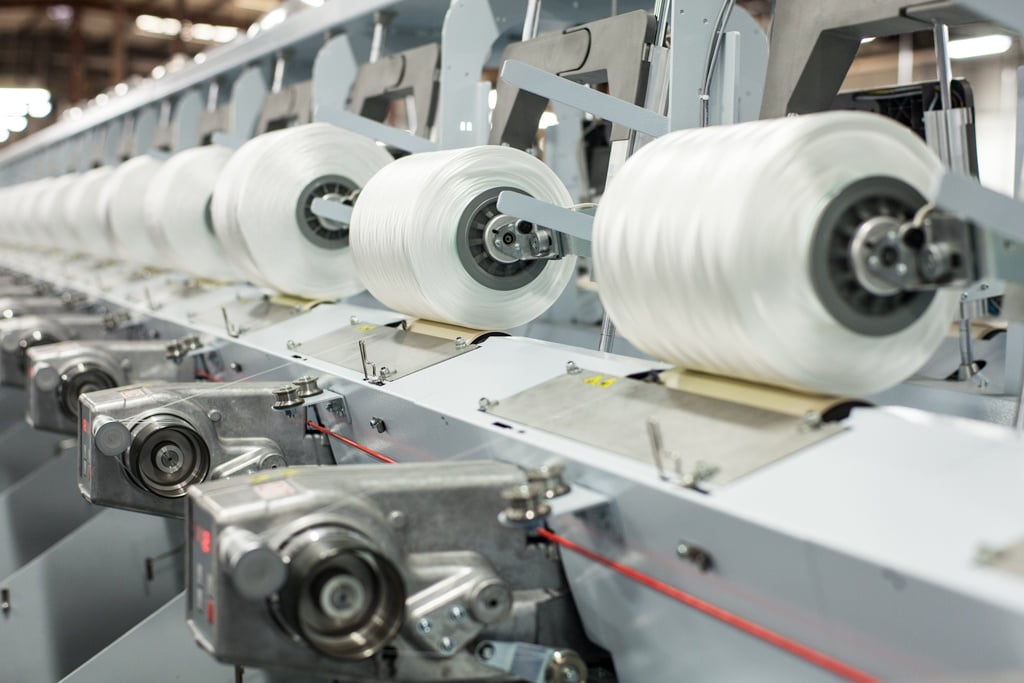
When raw material yarn shipments from China are late and you're meeting production demands with overtime charges,you might consider getting some help from a qualified yarn converter.
Here we review some of the common questions about commission conversion of commodity industrial yarns into a ready to use form for industrial product manufacturing applications.
What is commission yarn converting?
Commission converting or commission tolling is an outsourced yarn manufacturing step in yarn processing where spun or filament yarn is converted from the basic commodity form into a specific processed or partially processed form by a contract manufacturer. In a commission program the customer purchases the flat, or unprocessed yarn from the yarn spinner or fiber producer for delivery to the yarn converter company for processing. The processed yarn is then shipped ready to use to the purchaser, saving processing time movement and waste.
Why use a third party commission yarn processor?
Modern textile processing equipment requires large capital investment. Direct spinners and fiber producers focus most of their capital expenditures on adding capacity to produce higher volumes of a few basic types of commodity yarns at the lowest possible cost. This focus on volume does not allow yarn manufacturers much time or extra capital to convert the commodity yarn into different package size constructions that can be twisted, dyed, or treated. So the fiber yarn producer will often either contract with a convertor to supply the downstream processing on their behalf, or will recommend a tolling partner for the hose, wire, industrial fabric or other end-user.
What yarn processing services are contracted as commission work?
While almost any yarn processing can be contracted to a qualified industrial yarn converter, the most common processes are yarn twisting, yarn package dyeing, single-end treating, and yarn beaming or yarn winding to precision package cones or tubes.
When should I use a commission yarn converter?
Commission yarn processing is often used when:
- Production demand for a processed yarn operation (ex. twisting or winding) exceeds internal capacity – lead times for new textile manufacturing equipment are commonly between six to nine months so using a converter to handle increased demands can allow a manufacturer to build market share now, rather than waiting for new equipment installation.
- Labor cost reductions are needed - Some industries wind or twist yarn as a preparation step for making their manufactured products like thermoplastic hose or bundled telecommunications wire. These operations are typically seen as necessary non-value added steps and are often overlooked in the operational costing, treated as “zero-cost” labor operations, reasoning that the operators may have some downtime between operations that can be used to process yarn. Actual experience in our customers indicates that this results in having more operators than needed, and even overtime and downtime when processed yarn is needed but not available.
- Long lead time and issues with imported processed materials disrupt production – Most of the fiber and yarn production capacity can be found in Asia. For U.S. manufacturers, the fragility of this three month supply chain can create major disruptions when delivery dates are missed or quality issues are discovered in the imported shipment. A relationship with a good yarn converter can offset the risk of relying exclusively on imported materials.
- Equipment maintenance is a problem – Most yarn converters have the latest equipment and dedicated maintenance resources. Many customers who use industrial yarn in their product have older equipment that is difficult to keep in production with lack of spare parts and maintenance technician training.
- Non-standard production is needed – Yarn converters are usually experts in processing different types of fibers and yarns. A good yarn partner is probably better equipped to handle your requirements for medium sized production items that you might only make once or twice per month.
- Internal Waste Reductions are required – Every manufacturing process step involves some level of waste. Dealing with process waste creates a non-value added cost that can be eliminated through the outsourcing of a process step to a qualified yarn converter.
How is inventory reported under a commission converting program?
A good tolling or converting agreement will specify inventory reporting by per shipment, or for longer term agreements by week, or month. This agreement should include:
- Raw material yarn received quantity
- In process material amount
- Converted material shipped quantity
- Process waste as percentage of amount received.
What about waste?
Commission converting agreements normally have an agreed upon allowable waste factor expressed as a percentage of raw material processed. Typical values are between two to five percent when first quality raw materials are supplied to the converter. Waste greater than allowed may be charged back to the converter or replaced depending on the agreement specifics.
How about quality?
The best yarn converters are ISO 9001 registered and can build to, and provide, written yarn specifications for commission converting operations as well as certificates of analysis with verification of product specifications and testing.
Who are the best commission yarn converting companies in the U.S.?
While Service Thread does commission converting for filament yarn twisting, treating and winding, we also use other companies as needed for the reasons listed here. So we’ve put together a simple one page guide to some of the best companies, along with their specialties, for your use.



